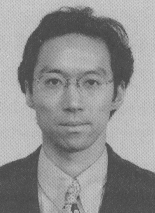
 |
Naoki AbeTheory NEC Laboratory |
- 1977-79 Studied at the United World College
- (UWC) in Canada
- 1984 Graduated with BS and MS degrees in
- Computer Science from MIT
- 1984-85 Worked as a researcher at IBM T.J.
- Watson Research Center
- 1989 Graduated with Ph.D. in Computer and
- Information Science at the University of
- Pennsylvania
- 1959-90 Worked as a post-doctoral researcher at
- the University of California, Santa Cruz.
- 1990 Joined NEC Corporation. Now assistant
- manager at NEC C&C Research Laboratories
- Hobby:Playing jazz (saxophone)
While studying at UWC and MIT, I thought of becoming a mathematician or a street jazz player, but in the end I chose my career as a researcher in artificial intelligence, partly inspired by a course I took at MIT taught by Professor Winston.
Since then, I have been involved in many aspects of AI. As an undergraduate, I developed an automatic music transcription program under supervision of Professor Minsky. At IBM, I conducted research in the area of natural language processing.
At the University of Pennsylvania, my encounter with Professor Weinstein gave me the opportunity to study computational learning theory. Sympathized with its approach of mathematically analyzing learning problems by expanding and applying the framework of theory of computation. Ever since, I have been involved in the area of machine learning.
With the advice from Professor Haussler an Professor Warmuth at the University of California Santa Cruz, I formulated and analyzed from the perspective of computational learning theory a density estimation problem which is very important for pattern and speech recognition. After joining NEC, I am continuing research in learning theory and its applications.
I am taking part in RWCP hoping to make a contribution to the problem of probabilistic knowledge acquisition, which is a key to "flexible information processing," from the standpoint of computational learning theoly. While conventional computation theories deal with deductive computation, which deduces facts from given axioms, learning theory analyzes inductive inference which attempts to derive axioms from finite data.
As inductive inference contains pattern recognition, intelligence processing and scientific discovery in a broad sense of the terms, computational learning theory could even be regarded as a unifying basic theory of flexible information processing.
Within a field with such an ambitious goal, however, the responsibility of an individual researcher is to actually make specific contribution. I am focused on several important aspects of learning theory in the hope that I will be able to make concrete and theoretical contributions.
The aspects that I am now working on are uncertainty in learning, group learning, sequentiality of learning and improvement on computational efficiency through active learning by queries.
It is my hope that I will be able to play a modest role in the development of novel information processing technology, through such technical contributions.